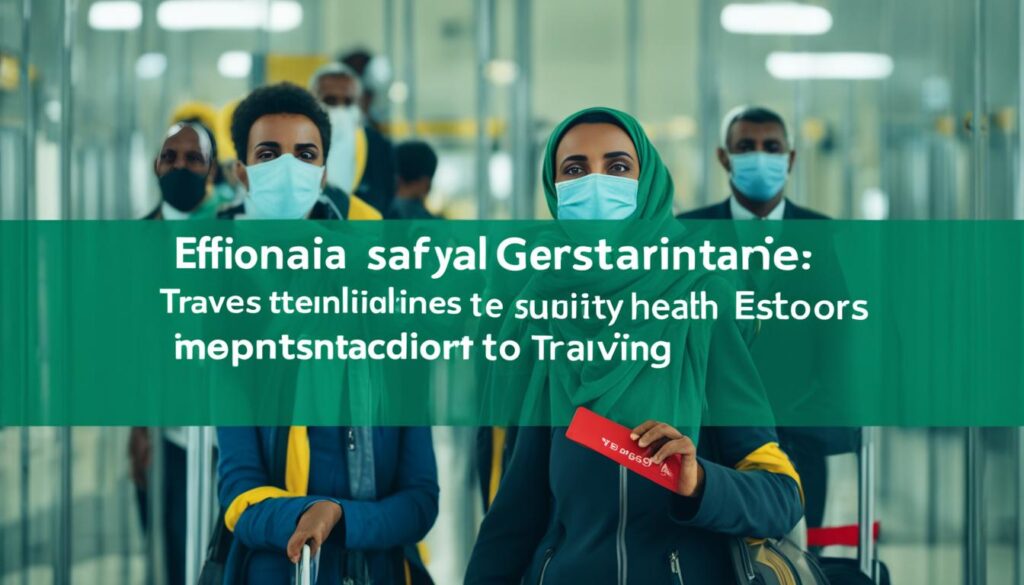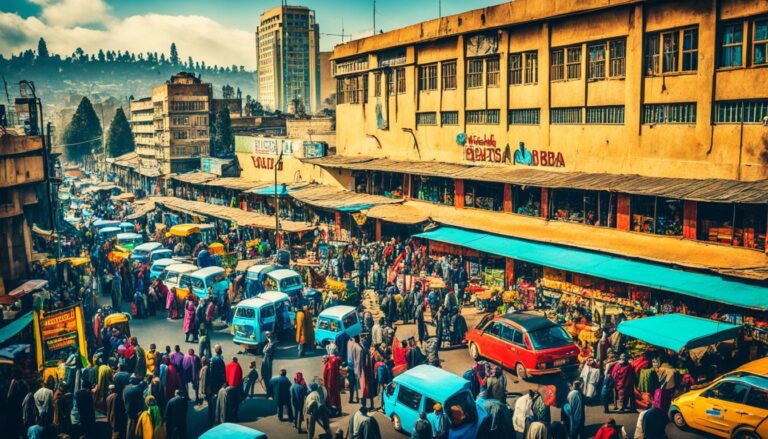Is Ethiopia Safe to Visit?
Did you know that Ethiopia is a country of diverse landscapes, rich history, and vibrant culture? From the ancient rock-hewn churches of Lalibela to the stunning landscapes of the Simien Mountains, there is no shortage of awe-inspiring sights to explore. However, before you pack your bags and embark on your Ethiopian adventure, it’s important to be aware of the safety conditions that exist in the country.
While Ethiopia offers a wealth of experiences for travelers, it is crucial to prioritize your safety and understand the potential risks you may encounter during your visit. From sporadic violent conflicts and civil unrest to crime and terrorism threats, being well-informed before you go is essential to ensure a safe and enjoyable trip.
In this article, we will delve into the current travel situation in Ethiopia, security concerns you should be aware of, safety tips to follow while traveling, and any travel restrictions that may be in place. By understanding the challenges and taking appropriate precautions, you can make the most of your time in Ethiopia while keeping yourself and your loved ones safe.
Key Takeaways:
- Reconsider travel to Ethiopia due to sporadic violent conflict, civil unrest, crime, communications disruptions, terrorism, and kidnapping in certain regions.
- Specific areas to avoid include the Tigray Region, border areas with Eritrea, the Afar-Tigray border, Gambella and Benishangul Gumuz Regions, and more.
- The security situation in Addis Ababa is stable, but other regions may experience sporadic violent conflict and civil unrest.
- The travel situation in Ethiopia is unpredictable, with the government often curbing mobile communications and internet access during episodes of civil unrest.
- There are concerns related to terrorism, kidnapping, crime, and ethnic conflicts in various regions, particularly in border areas.
Current Travel Situation in Ethiopia
https://www.youtube.com/watch?v=MtVvZPkwnCc
The travel situation in Ethiopia can be volatile and unpredictable, with sporadic violent conflict and civil unrest occurring in various regions. It is important to be aware of the potential risks and take necessary precautions when considering a visit to Ethiopia.
During episodes of civil unrest, the government has been known to curtail mobile communications and internet access. This can make it difficult to contact family members and access emergency services, adding to the challenges faced by travelers in these situations.
Additionally, it’s worth noting that U.S. government personnel are restricted from traveling to certain regions within Ethiopia. These include the Tigray and Amhara regions, Gambella, Benishangul Gumuz, and specific areas in Oromia and SNNP regions.
It is essential to stay informed about the current travel situation in Ethiopia and follow any official travel advice or warnings issued by local authorities or your government. Taking these precautions will help ensure your safety and well-being while visiting Ethiopia.
When planning a trip to Ethiopia, it is advisable to consider various safety tips and precautions to help mitigate potential risks. By following these guidelines, you can enhance your travel experience and minimize any potential safety concerns.
1. Stay Updated and Informed
Regularly monitor local media for any breaking news or updates regarding the security situation in Ethiopia. This will allow you to stay informed about any potential risks or advisories in specific areas you plan to visit.
2. Research Your Destination
Prior to your trip, conduct thorough research about the specific regions or cities you plan to visit in Ethiopia. Understand the local customs, traditions, and any specific safety concerns related to those areas. This knowledge will better prepare you to navigate and adapt to the local environment.
3. Register with Your Embassy
Enroll in the Smart Traveler Enrollment Program (STEP) offered by your country’s embassy or consulate. This free service allows you to receive travel advisories, alerts, and notifications in case of an emergency. It also helps embassy officials locate and assist you more easily during your trip.
4. Stay Alert and Be Mindful of Your Surroundings
Always be aware of your surroundings and remain vigilant, especially in crowded areas, tourist sites, or public transportation. Keep an eye on your belongings to prevent theft and avoid displaying signs of affluence that may attract unwanted attention.
5. Follow Local Laws and Customs
Respect the laws, customs, and traditions of Ethiopia during your visit. Familiarize yourself with local regulations and cultural norms to ensure that you do not unintentionally violate any rules or cause offense.
6. Carry Important Documents Securely
Make copies of your passport, visa, and other important travel documents. Keep the originals in a secure place, such as a hotel safe or a hidden pouch under your clothing. It’s also a good idea to leave copies of these documents with a trusted individual back home.
7. Use Reliable Transportation and Accommodation
When using transportation services or booking accommodations, choose reputable and reliable providers. Research and read reviews to ensure that the services meet safety standards and have a good reputation among travelers.
By following these safety tips and taking necessary precautions, you can have a more enjoyable and secure experience while traveling in Ethiopia. Remember, your safety is of utmost importance, so prioritize it throughout your journey.
Security Concerns in Ethiopia
When considering travel to Ethiopia, it is crucial to be aware of the security concerns that exist in the country. These concerns encompass various factors, including terrorism, kidnapping, crime, and sporadic violent conflict.
One area of particular vulnerability is the border regions, where criminal activity and violence pose significant risks. Border areas with Eritrea, Kenya, Somalia, Sudan, and South Sudan should be approached with caution.
The Danakil Depression in the Afar region has seen instances of foreigners being targeted, making it important to exercise extra caution while visiting this area.
Additionally, conflicts between different ethnic groups have resulted in casualties, particularly in the Amhara and Oromia regions. This underscores the need to remain vigilant and avoid these volatile areas.
Kidnapping risks exist in several regions, including Somali, Gambella, and Oromia, as well as in the border areas with Kenya, Somalia, South Sudan, and Eritrea. Travelers should be cautious and take appropriate measures to mitigate these risks.
“Ethiopia’s security landscape poses various challenges, primarily related to terrorism, kidnapping, crime, and sporadic violent conflict. Border areas, ethnic conflict hotspots, and regions prone to kidnapping require increased vigilance and security measures.”
| Security Concerns | Risk Level |
|---|---|
| Terrorism | High |
| Kidnapping | Medium |
| Crime | Medium |
| Sporadic Violent Conflict | High |
Safety Tips for Traveling in Ethiopia
If you decide to travel to Ethiopia, it is important to prioritize your safety and take necessary precautions. Here are some essential safety tips to keep in mind:
Stay Informed and Be Flexible
Monitor local media for any breaking events or updates on the security situation in Ethiopia. Keep yourself informed about potential risks and be prepared to adjust your travel plans accordingly for your own safety.
Be Aware of Your Surroundings
Always stay vigilant and conscious of your surroundings, especially in areas frequented by U.S. citizens and foreign travelers. Trust your instincts and avoid any place that feels unsafe or uncomfortable.
Carry Important Documents
Make sure to carry a copy of your passport and visa with you at all times. It’s also advisable to have digital copies stored securely in case of emergencies. Having these documents readily available will help in case you need to prove your identity or travel status.
Have an Evacuation Plan
When traveling to Ethiopia, it’s crucial to have a contingency plan that doesn’t rely solely on U.S. government assistance. Familiarize yourself with evacuation procedures and have a clear plan for emergency situations.
Enroll in the Smart Traveler Enrollment Program (STEP)
Enrolling in the Smart Traveler Enrollment Program (STEP) run by the U.S. Department of State is highly recommended. By registering your trip, you’ll receive important safety alerts and updates from the U.S. Embassy or Consulate in Ethiopia. It also helps local authorities locate and assist you in case of emergencies.
“To ensure a safe trip to Ethiopia, it’s crucial to stay informed, be aware of your surroundings, carry important documents, have an evacuation plan, and enroll in the Smart Traveler Enrollment Program (STEP).” – Your safety is our priority
By following these safety tips, you can enhance your travel experience in Ethiopia while minimizing potential risks. Remember, personal safety should always be your top priority. Keep yourself informed, take necessary precautions, and enjoy exploring the rich culture and captivating landscapes of Ethiopia.
Travel Restrictions in Ethiopia

When planning your trip to Ethiopia, it is important to be aware of the travel restrictions and areas to avoid. The U.S. government has imposed restrictions on certain regions in Ethiopia due to safety concerns and the potential for violence. These restrictions apply to both U.S. government personnel and personal trips.
U.S. government personnel are prohibited from traveling to the following regions:
- Tigray region
- Amhara region
- Gambella
- Benishangul Gumuz
- Specific areas in Oromia and SNNP regions
In addition to these specific regions, personal trips to national border regions, including those with Sudan and South Sudan, are also restricted. These regions are considered high risk due to the presence of heightened security measures and the potential for violence.
It is important to stay informed about the current travel restrictions and follow the guidance of local authorities to ensure your safety during your visit to Ethiopia.
Restricted Regions in Ethiopia
| Restricted Regions | Reason for Restriction |
|---|---|
| Tigray | Violence and conflict |
| Amhara | Violence and conflict |
| Gambella | Violence and conflict |
| Benishangul Gumuz | Violence and conflict |
| Specific areas in Oromia and SNNP regions | Violence and conflict |
| National border regions with Sudan and South Sudan | High-risk areas |
Crime and Safety Precautions in Ethiopia

When traveling to Ethiopia, it is important to be aware of the potential safety concerns and take necessary precautions to ensure a secure trip. While crime, including petty theft and violent robbery, can occur in various parts of the country, it is particularly prevalent in Addis Ababa, the capital city. Areas such as Bole Medhanealem, Bole Atlas, Meskel Square, Merkato, and Entoto are known to have higher incidents of theft (Source: U.S. Department of State).
To protect yourself and your belongings, it is advised to stay vigilant and follow these safety tips:
- Avoid displaying signs of affluence, such as expensive jewelry or electronic devices, which may attract unwanted attention.
- Keep your belongings secure and close to you at all times, especially in crowded areas and public transportation.
- Use well-lit and guarded parking areas for your vehicles.
- Avoid walking alone after sundown, especially in unfamiliar or poorly lit areas.
- Comply with any requests from security forces if stopped, as they are there to ensure your safety.
By following these safety precautions, you can reduce the risk of becoming a target for crime and enhance your overall travel safety in Ethiopia.
Quote:
“Ensuring your personal safety starts with being aware of your surroundings and taking necessary precautions to protect yourself and your belongings. By staying vigilant and following local safety advice, you can have a safe and enjoyable trip to Ethiopia.”
In addition to these safety precautions, it is important to stay informed about the current security situation. Always monitor local media for any breaking events and be prepared to adjust your travel plans accordingly. If you encounter any safety concerns during your trip, contact the local authorities or your embassy for assistance.
Next, we will discuss the terrorism threat in Ethiopia and the necessary precautions to mitigate potential risks.
Terrorism Threat in Ethiopia
There is an underlying concern for terrorism in Ethiopia, with groups like Al-Qa’ida and al-Shabaab targeting Western interests and other potential targets in East Africa. It is important for travelers to remain aware of this risk and take necessary precautions to ensure their safety.
The terrorist organizations in Ethiopia continue to plan attacks specifically targeting U.S. citizens and Western targets. Therefore, it is essential to exercise caution and vigilance while traveling in the country.
Areas that are considered to be at a higher risk include government buildings, hotels, places of worship, schools, parks, shopping malls, and public transportation systems. These locations may be attractive targets for terrorist activities.
Although security measures are in place to mitigate these risks, it is important for travelers to remain proactive and follow the advice of local authorities. Staying informed about the current security situation and being prepared can help ensure a safer travel experience.
When it comes to terrorism threats in Ethiopia, it is crucial to stay up-to-date with the latest information and take appropriate precautions to mitigate risks. By remaining vigilant and following local guidance, travelers can make informed decisions and prioritize their safety.
Conclusion
While mesmerizing with its captivating culture and breathtaking landscapes, Ethiopia poses significant safety concerns that should not be overlooked. The country faces sporadic violent conflicts, civil unrest, crime, and terrorism, which demand travelers to exercise caution and take appropriate measures. It is vital to carefully assess the risks and prioritize personal safety above all.
To ensure a safe journey, staying well-informed is crucial. Pay attention to local media updates and closely follow the guidance provided by local authorities. Remember that the situation in Ethiopia can change rapidly, necessitating constant vigilance. By adhering to the advised safety precautions, we can minimize potential risks and mitigate any challenges that may arise.
Throughout your visit, always stay aware of your surroundings and exercise discretion when displaying signs of affluence. Carry a copy of your passport and visa at all times and have contingency plans in place that do not rely solely on US government assistance. Consider enrolling in the Smart Traveler Enrollment Program (STEP) to receive important alerts and ensure easy accessibility in case of emergencies.






